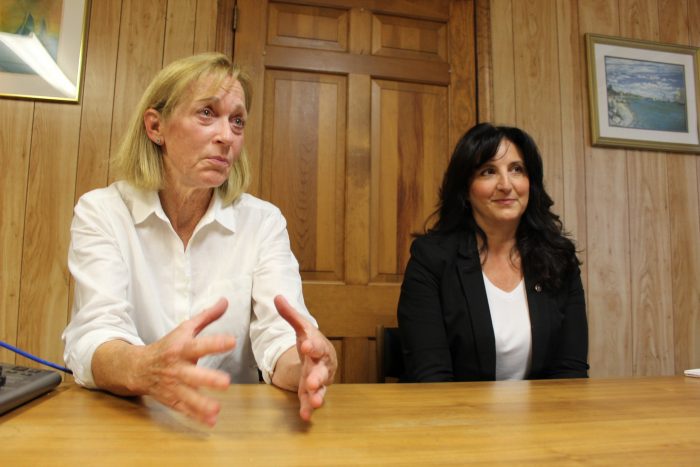Snaden is a vote for stability
On Monday, June 5, I ran my last public meeting as mayor of Port Jefferson Village. Over my 14-year tenure, I have run and attended well over 6,700 meetings and spent countless hours serving and representing this great village.
It has truly been my great honor to serve, protect and build our community, stabilizing the tax base, building our reserves now to well over $2 million, while improving our parks, paving our streets and reducing crime (as Suffolk County police reported at our last meeting).
It is hard work, committed work and work that doesn’t result from a crash course. It is work that comes from spending lots of time sitting in the seat, getting to know your partners, revenue streams, who to call and when to call. It takes thick skin, the ability to listen and most of all — the ability to know when it’s time.
I am endorsing Deputy Mayor Kathianne Snaden to be our next mayor — to be my mayor. Why? Because she is ready – she has trained for five years, is more than capable and she cares and has passion for this community.
I made the decision to retire because I knew my successor was ready, willing and able. You can’t learn this job in under a year — it’s not possible. And for goodness sake, why would we want a neophyte mayor when we can elect Kathianne and keep our trustees in place so they can continue to learn and serve?
Doing otherwise would be so detrimental to the trajectory of this village — it would wreak havoc and result in a devastating, unstable and inexperienced board creating damage that might be irreparable for years to come.
A vote for Deputy Mayor Snaden is a vote for stability and to keep your board intact so we can move onward and upward together. Please be responsible and get out to vote on June 20 at the Village Center. After our 14 years together, please help me in this one last request: To vote for Katharine Snaden to protect our beloved Port Jefferson and ensure it remains our very own beautiful destination — for a lifetime or a day.
Margot J. Garant
Mayor, Village of Port Jefferson
Sheprow will shake up status quo
As a lifelong resident and former trustee of Port Jeff, I am enthusiastically supporting Lauren Sheprow for village mayor.
A vote for the opponent will maintain the status quo at Village Hall. We cannot afford to continue the fiscal and land-use policies of the current administration.
In 2008, when I was a trustee, a significant and illegal situation in a residential area was brought to the board’s attention. Shockingly, 14 years later, the problem persists. We need a mayor who will be proactive, respond quickly to problems and represent all of us. That person is Lauren Sheprow.
Sheprow will ensure land-use decisions are made with the advice of village professionals, taking into account the need to preserve the character of our cherished village while revitalizing certain areas. We can and must do better.
Please join me by writing in “Lauren Sheprow” in the write-in space for mayor on the ballot.
Virginia Capon
Port Jefferson
Editor’s note: The writer is a former Port Jefferson Village trustee.
Snaden’s commitment to public safety
As someone with a career in law enforcement, I admit to being very impressed by Kathianne Snaden.
Deputy Mayor Snaden’s ongoing dedication to public safety has truly been something to behold. Even as a new trustee, I often remember seeing her at the Suffolk County Police Department 6th Precinct monthly meetings, engaging with the department, taking notes and advocating for more involvement by SCPD within the village. This was going on since day one of her being an elected official.
Her involvement with SCPD over the years — both at Village Hall and at the 6th Precinct — still continues to this very day. There have been ever evolving improvements with our own code officers, her many different initiatives such as having code officers on bicycles, code officers meeting every inbound train uptown and working with the schools to allow code officers to be a presence there, again to name a few.
She is always interacting with the 6th Precinct Whiskey Unit every summer, always being on call and present whenever necessary at any time of day or night. She has even gone on a few ride-alongs to really dig deep and be involved in every aspect of public safety. It’s so refreshing to see.
It is true, the flowers in the village are beautiful. However, what is more beautiful is an elected official who has worked on improving the safety of our village for years since day one. I am confident Kathianne will use this experience and institutional knowledge as our mayor to continue making Port Jeff the best it can be.
Keith Ottendorfer
Port Jefferson
Sheprow will bring change
Experience counts, but wisdom counts more. Networks, contacts and vision count more.
Lauren Sheprow brings to our village a wide range of professional management experience, an extensive network of contacts in the village — including myself, Stony Brook University and beyond, and a tradition of resident enfranchisement. She will also bring integrity.
You will need to write in Lauren’s name on June 20, and you will need to write in exactly as prescribed. This, because your current establishment continues its tradition of unfair dealing; this, because your current establishment throws out petitions on technicalities — instead of saying, “Take this back, you forgot something.”
The opposition response? Getting a little scared? Eliminate the competition. We are seeing character assassination in the form of unsigned attacks.
Do you know your village history? Seems a lot like what happened to Mark Lyon when he was trustee. (Mark had made a negative comment on the Lombardi’s renovation to Port Jefferson Country Club, a last-minute leak that cost him his seat.)
I have a lot to say about Port Jefferson, but I say it in signed letters or in an open public forum.
There is much that is not being done and much that needs to change.
Remember our recent code enforcement scandal? It didn’t have to happen. I warned the board of trustees of this.
We need to look to our future. We are losing 50% of our power plant revenue but we could lose the other 50% starting in 2027.
Decommissioning
It is time to attend to this. Lauren will reach out and bring in people with the networks to address these issues. Conversations with LIPA, PSEG, National Grid and the new public LIPA. Conversations about future technologies — here in Port Jefferson.
LIPA, LIRR, Lawrence Aviation, revenue from solar installation battery storage — here in Port Jefferson. We need to start attending to all of these big issues.
Lauren will bring in the people of Port Jefferson who can make it happen. Lauren will lead.
Bruce Miller
Port Jefferson
Editor’s note: The writer is a former Port Jefferson Village trustee.
Is this your village?
It is changing. Is it changing for the better? Behemoth apartments. A code enforcement group that seems out of control.
I put in much time and effort working with the Grassroots Committee to Repower Port Jefferson. The whole community was involved. What happened to that community effort? It seems like little is happening. It seems like it has all been pulled inside the village. All is secret.
The school district and the community are no longer involved. No efforts are being made for a positive economic future. Are we just awaiting taxes doubling? There are alternative sources of tax revenue but they are not being pursued. Ms. Snaden suggests “experience” in her campaign. Experience in what? Our planning department is just a rubber stamp for developers. Code enforcement?
Brookhaven Industrial Development Agency
This committee is giving your tax dollars and services away to multimillionaire developers. Apartment buildings are not “industrial.” Where are the long-term jobs the IDA was designed to create? The first village development on Texaco Avenue was well through the planning process as a private sector investment. The IDA board was scrambling to throw money at this development and win favor with this developer — and future developers — before time ran out and the plans approved.
Uptown is a mess. But why? We have ordinances to ensure decent commercial housing. Were these ordinances ever enforced? Or were these four blocks allowed to deteriorate to give developers greater leverage for more dense development through more dense zoning? (Speaking of dense zoning: Maryhaven? Really?)
Above-ground parking garages? We are looking more like Queens every year.
What’s your comfort level with our current Village Hall? Let us not be intimidated by one joker with an iPhone. Let’s reopen Village Hall to our villagers.
Remember, Lauren is for the residents.
Molly Mason
Port Jefferson
AHEPA upholds American ideals
Almost exactly 100 years ago, in the summer of 1922, the American Hellenic Educational Progressive Association was established.
The organization was formed in response to attacks on Greek immigrants by the Ku Klux Klan and other racist and anti-immigrant groups operating across the country. Although now, several generations later, Greeks are successful and well established in American society, to this day AHEPA remains active and continues to promote the best qualities of Ancient Greek society, including philanthropy, education, civic responsibility, integrity, family and individual excellence through community service and volunteerism.
Always faithful to its history, AHEPA was instrumental in the restoration of Ellis Island and the Statue of Liberty, through which millions of immigrants flowed, often with little more than one or two pieces of hand luggage and a dream.
This past weekend, I was invited by AHEPA and the local Greek-American community to be recognized for public service. To receive an award from an organization of this quality was truly humbling, and I am very thankful to the community for its kindness.
Reflecting on the history of AHEPA, I was reminded that although Greek immigrants ultimately overcame their challenges, successive groups of immigrants continue to face the same fears, the same attacks and the same bigotry.
People rarely leave their native countries and immigrate to the United States because things are going great for them at home. The choice to leave behind their food, language and culture is a painful decision, never taken lightly, and very often in desperation.
But Lady Liberty doesn’t just open her arms to the wealthy, the gainfully employed and the highly educated. Her invitation extends to “your tired, your poor, your huddled masses yearning to breathe free, the wretched refuse of your teeming shore. Send these, the homeless, tempest tossed to me” [Emma Lazarus’ famous 1883 sonnet, “The New Colossus”].
Fortunately, throughout history there have been those with compassion and courage who have stood up to defend true American ideals. Our nation is a nation of immigrants, and although immigrants sometimes arrive with empty pockets, they have that hustle which helped build America into the amazing land of opportunity it is today.
I am so proud to know the good people of AHEPA and my many friends within the Greek community who have been a beacon of moral courage, compassionate leadership and democracy not just for 100 years, but for thousands.
Jonathan Kornreich
Councilmember, Town of Brookhaven
Stony Brook
Carlton “Hub” Edwards: an uplifting story
Congratulations to Rita J. Egan and The Village Times Herald for a wonderfully uplifting story on Carlton “Hub” Edwards [“Veteran Stories” series in Arts & Lifestyles section, also TBR News Media website, May 25].
A Korean War veteran, he’s been a knowledgeable, affable, active and patriotic fixture in our community for many, many decades.
One of Ms. Egan’s many interesting highlights features Hub unquestioningly trading his baseball glove and local team jersey for the uniform of our United States Army. What people may not know is he made that switch after being drafted by the Brooklyn Dodgers, who happened to be one of the top three or four Major League teams in 1951.
The pitcher of three no-hitters simply said, “Uncle Sam took first precedence,” feeling even today that the military can provide much-needed discipline for young people.
Whether it’s been Hub’s work at the American Legion Irving Hart Post 1766, his Bethel AME Church or our Three Village Historical Society, the post’s community liaison Joe Bova summed up things perfectly: “He really felt strongly about what his commitment to people should be and that just transferred over to the community he belongs to.”
Talking to Hub or his lovely wife, Nellie, whether it be at the Memorial Day ceremony or during a Frank Melville Memorial Park concert, is both a treat and an enriching experience. Here’s hoping those who haven’t read the article will now take the opportunity to do so.
Jim Soviero
East Setauket
Yes, words do matter
I found the title to Shoshana Hershkowitz’s recent letter on the immigration debacle taking place quite ironic [“Words matter in immigration dialogue,” May 25]. Let’s examine “words matter” for a moment, shall we?
I wonder if anyone remembers when people were caught entering our country illegally, they were referred to as illegal aliens. That term was legally accurate, yet deemed offensive to progressives. The acceptable words to describe a person in our country illegally then became undocumented immigrant.
Now, the words (that matter) have become “asylum seeker.” Asylum is defined as protection granted to a political refugee. It was not intended to bypass the legal immigration process for people that want to enjoy all of the benefits of living in the United States. I think honest people can agree that not everyone coming over our border illegally is a political refugee.
I fully support legal immigration. No one is above the law in the U.S. Once again, the compassion and goodness of the people of this country is being taken advantage of by progressives that created this unprecedented and unsustainable surge.
I read that Vice President Kamala Harris [D] was supposed to be figuring out the “root cause” of the surge at our border. I have not seen her give an explanation yet. Could it be progressive policies? For example, in New York, politicians declared a sanctuary state and gave out over $2 billion of taxpayer money to noncitizens through the Excluded Workers Fund. Is that an incentive to come here illegally?
Ms. Hershkowitz quoted Kevin McCaffrey [R-Lindenhurst], presiding officer of the county Legislature, stating, “We don’t know who’s coming over.” Is that not a true and fair statement? Ms. Hershkowitz says asking that question implies that asylum seekers are a danger to us. How extremely disingenuous of her.
Our leaders cannot ask simple, reasonable questions about who enters our country now? Can Ms. Hershkowitz personally vouch for all of these people? In New York City, the mayor was housing some of these people in public school facilities. Our governor is considering using our taxpayer-funded universities to house these people in our neighborhoods, and our elected officials cannot ask any questions without being labeled xenophobic or accused of demonization?
Seems like Ms. Hershkowitz’s rhetoric is a bit extreme to me. Does constantly labeling people who you don’t agree with politically as evil or dangerous, just for asking questions, bring us together or divide us?
Words matter … indeed.
Charles Tramontana
East Setauket
Open letter to Assemblyman Ed Flood
Dear Assemblyman,
I urge you to vote for the Birds and Bees Protection Act when it comes before you this week. The bill (A7640/S1856A) will protect honey bees and other pollinators from neurotoxic pesticides known as neonicotinoids which are having a devastating impact on bees.
You might not be aware, but the original bill was worked on by Maria Hoffman, my wife and longtime state Assembly staffer and local Setauket beekeeper, in response to the massive die-off of bees caused by these new genetically manufactured nerve agents that are coated on corn and soybean seeds and then spread by contact with bees as they forage for nectar and pollen.
You should also know that the bill is very specific and bans only neonic-coated corn and soy seeds and does allow farmers to use locally applied pesticides if their crops are threatened.
Beyond the partisan wrangling of our elected officials that seem to take up so much of government lately, you should know that your Assembly district has a strong environmental leaning by both Democrat and Republican residents of the district. The Birds and Bees Protection Act has strong support districtwide and your constituents will appreciate your leadership on this important bill.
George Hoffman
Setauket
Another Birds and Bees plea to Assemblyman Flood
How disheartening to think the state environmental bill A7640/S1856A, the Birds and Bees Protection Act, that has the bipartisan support of Town of Brookhaven Supervisor Ed Romaine [R] and other local legislators, may not be supported by our new state legislator Assemblyman Ed Flood [R-Port Jefferson].
Maria Hoffman, a local Setauket beekeeper who originally helped formulate this bill, was a steadfast advocate for environmental protection and a dear friend who passed away last year. Many in the community knew and respected Maria.
We are very dedicated to protecting our waterways in this district and wholeheartedly support this bill. Its intent is to protect honey bees as well as all other pollinators from neurotoxic pesticides known as neonicotinoids.
These nerve agents are coated on corn, soy and other seeds prophylactically to avoid agricultural pests. They are now widely used by large nurseries as well to avoid pests during transport of stock to local stores.
There is significant opportunity for misapplication by both farmers and homeowners which leads to residue of these toxins in field margins, local waterways and potentially the produce we eat. Integrated pest management, regulated by the EPA, would still permit farmers to treat threatened crops.
I urge Mr. Flood to respect the strong environmental leaning of both Democrat and Republican residents of his district. These constituents will value leadership in passing this important bill.
Anne Chimelis
East Setauket
Boating safety is necessary
Thanks to TBR News Media for their timely editorial on boating safety [“Safety key to a successful summer,” May 25].
The sobering facts about boating safety should be of concern to everyone who enjoys the water this year. There is little doubt that the use of a personal flotation device, or life jacket, would have contributed to saving a number of lives lost due to drowning.
There are a number of organizations which offer short courses that provide a New York State boating safety certificate or its equivalent, including the U.S. Coast Guard Auxiliary and the United States Power Squadrons — America’s Boating Club.
Just this past spring, the Mount Sinai Yacht Club, in association with the Suffolk County Police Department, ran a boating certificate course for the general public. These courses give you an opportunity to talk to instructors and get all your questions and concerns answered.
The requirement for all operators of a motorized vessel to have a boating safety certificate is being phased in by age. As of Jan. 1, 2025, every operator of a motorized vessel in New York state waters will be required to have a boating safety certificate or its equivalent.
Beverly Tyler
Certified instructor and past commander
Old Field Point Power Squadron
MTA’s continued staffing, safety failures
The Metropolitan Transportation Authority inspector general’s report on excess employee overtime and safety issues is nothing new for Port Jefferson Branch riders.
Every generation of MTA chairmen, agency presidents, board members, finance officers and executive management who manage agency budgets has made the wrong choice. They believed it would be cheaper to pay overtime than hire additional employees, whose critical specialized skills were necessary for maintaining functioning safe and reliable transportation operations.
They thought it would be less expensive by avoiding the costs of training, full-time salary plus fringe benefits, medical insurance and pensions by not increasing the headcounts of various departments. This has contributed to excessive overtime and potential safety issues.
The LIRR should have the ability to hire more full-time and part-time employees to deal with routine and emergency workloads. This would provide a larger pool of employees resulting in less overtime, excessive and unsafe work hours for employees.
Another option is upon reaching retirement eligibility, allow employees to collect 50% of their pensions while still being able to work part time. MTA Chairman Janno Lieber and LIRR President Catherine Rinaldi should include both in the next round of contract negotiations with SMART Transportation Division 505 Union General Chairman Anthony Simon.
Larry Penner
Great Neck
Severe lead poisoning of local swan
We live in Port Jefferson, close to Mount Sinai Harbor. Last Sunday, a swan came to visit us, which was most unusual because they never come up from the harbor. This juvenile looked really sick. We called Lisa Jaeger, who rescues animals, and she trapped the swan and brought him out to the Evelyn Alexander Wildlife Rescue Center in Hampton Bays, where he was diagnosed with severe lead poisoning. The swan may not survive. He will be at the wildlife rescue center for a long time.
Severe lead poisoning? How did this happen? We have learned that duck hunters often use lead shot — even though it’s illegal — and it falls to the bottom of the harbor and gets ingested by swans.
How much lead is sitting at the bottom of the harbor? Are the clams, mussels and oysters that fishermen dig up from the harbor contaminated, too? People kayak and swim here and walk their dogs, and we worry that the dogs could also ingest the lead.
We want Port Jefferson residents to be aware of how our harbor is being polluted. Perhaps we can work together to ensure that no other swans suffer as this juvenile is suffering.
Cynthia Kravitz
Peter Boerboom
Port Jefferson
A sad episode for Smithtown
How ironic it is that those who ran Martine Francois-DePass out of town with their bigoted and hateful social media campaign are themselves Exhibit A for exactly that which they so passionately deny: Namely, that racist discrimination against Black people, far from being a thing of the past, is still very much with us. [See June 1 story, The Times of Smithtown.]
It’s yet another reminder that America in general and Smithtown in particular continue to be far from the ideal of a color-blind society to which we all aspire.
What a missed opportunity. An opportunity to expose Smithtown children to a positive authority figure from a minority background. An opportunity to move the needle on the perception of Smithtown as a community hostile to non-whites. An opportunity to stand up and defeat fear and bigotry. The decision of Ms. Francois-DePass to withdraw from consideration as principal of Smithtown Elementary in the face of a campaign of vilification and hate against her is our loss, not hers.
Does anybody seriously believe that if Ms. Francois-DePass was white, her every word on social media would have been subjected to the same kind of aggressive and invidious scrutiny? Not that there was anything troubling about her social media posts. She supports Black Lives Matter and racial justice. What a surprise. Is that the litmus test? If it is, it amounts to a frankly racist refusal to countenance the hiring of just about any Black person.
One Smithtown parent stood up at a school board meeting and proclaimed that Ms. Francois-DePass was unqualified. What nonsense. She has degrees from Boston University, SUNY Stony Brook and an advanced degree from Fordham. She also has an advanced certificate in educational leadership and administration from Long Island University, experience as a New York City school teacher for 18 years and as an assistant principal here in Suffolk in the Longwood school district for four years.
Another parent posted that he was going to tell his child not to recognize this “piece of trash” and to “disregard any guidance/direction given by this person.” What a great example for his child.
Is this how some parents want to be “involved” in their children’s education? Racism is still very much with us largely because it’s passed down from generation to generation. What a sad, sad episode this is for our Smithtown community.
David Friedman
St. James














